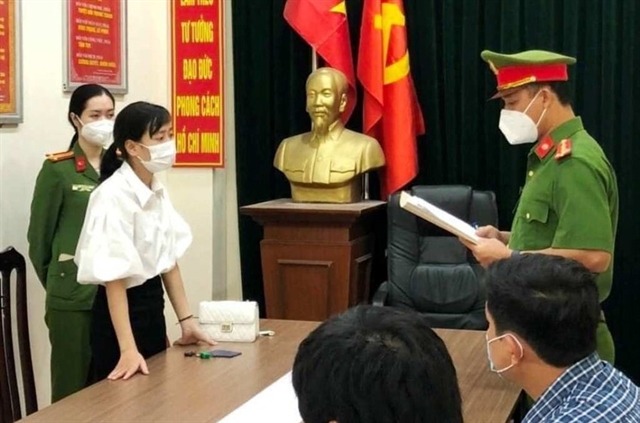 Economy
Economy


|
| Police announce the arrest of valuator Hoàng Thị Tâm for intentional mispricing of medical equipment. Photo plo.vn |
HÀ NỘI — Valuation analysis is a vital step in governmental procurement, equitisation, and withdrawal of State capital, but insiders say intentional misvaluation has been causing significant losses to State assets in recent years.
Phạm Văn Bình, Head of the Ministry of Finance's Valuation Office, asserted that fraudulent misvaluation has been witnessing an upsurge, and many valuators have ended up in jail.
Their trick was to conspire with contractors and sub-contractors to deliberately misprice assets, thereby lining their own pockets.
"Under the Law on Price, valuators may have their licences revoked and face severe punishments if their misconduct causes financial damages to the extent that constitutes a criminal offence," he said.
Vũ Đình Ánh, former Deputy Head of the Research Institute for Market and Price, underscored incompetent firms as the primary cause behind the issue.
This is because their incorrect and insufficient data has produced misleading output that misrepresents asset values.
Worse still, some firms do so on purpose for their gains and at the cost of other third parties, including the State.
"No regulations have been issued so far defining valuation firms' liability after they issue their valuation analysis," he added.
Trương Thanh Đức, Director of the law firm ANVI, held that it would be impractical to use stricter administrative procedures to curb misvaluation. Instead, he suggested using market forces to drive out bad valuation firms.
The idea is simple. For each firm, their accuracy ratios, customer feedback and complaints, and performance will be made public. Firms with bad performance will have to improve their valuation accuracy or otherwise be rejected by customers.
He also called for transparency in contractor selection to screen out bad valuation firms and said the openness could be achieved through competitive bidding.
"It is a concern that many public agencies directly appoint valuation firms rather than selecting the best ones through competitive bidding," he said.
The director also remarked that some other agencies embrace transparency in name only as they give little press coverage to their bidding announcements.
Lê Huy Thành, Deputy Director of the VSA Auditing and Consulting LTD, said valuation firms must have at least five valuators on the payroll and capital of no less than VNĐ5 billion under the recent draft amending the Law on Price.
The draft, he believes, has been designed in the same manner as does the Law on Independent Audit, which requires a minimum of five auditors and VNĐ5 billion of capital for every auditing firm.
"The rise in staff requirement from three to five would force small-sized valuation firms to merge and upsize to be legally qualified. The expansion, in turn, will improve their performance," he said.
Nguyễn Hữu Huân, lecturer at the University of Economics Hồ Chí Minh City, urged the authorities not to set the bar too high for valuation firms as higher barriers would discourage new firms, reduce healthy competition and push up fees.
He said it was not valuation firms but valuators themselves that the authorities should keep a close watch on to prevent moral hazard. He called for frequent assessments to replace one-off licence exams to force them to keep up with the times.
"The authorities have to monitor valuators to ensure their independence and ethical compliance closely," he said.
The lecturer also calls for using artificial intelligence and big data to keep mispricing at bay since the technologies, with their vast data, could detect suspicious price discrepancies.
Ngô Minh Hải, Deputy Head of the Gia Định University, underlined data feeding and valuator competence as the key to the performance of valuation firms.
However, he was concerned that many valuators in Việt Nam gathered past data to perform valuation analysis, resulting in misleading figures. He attributed the improper data mainly to the absence of decent data providers in the country.
"Data in developed financial markets are tremendous and up-to-date, and their evaluators are more competent than ours. That's why they produce better valuation," he said.
He shared Huân's view that the authorities must employ frequent assessments to categorise valuators. — VNS




